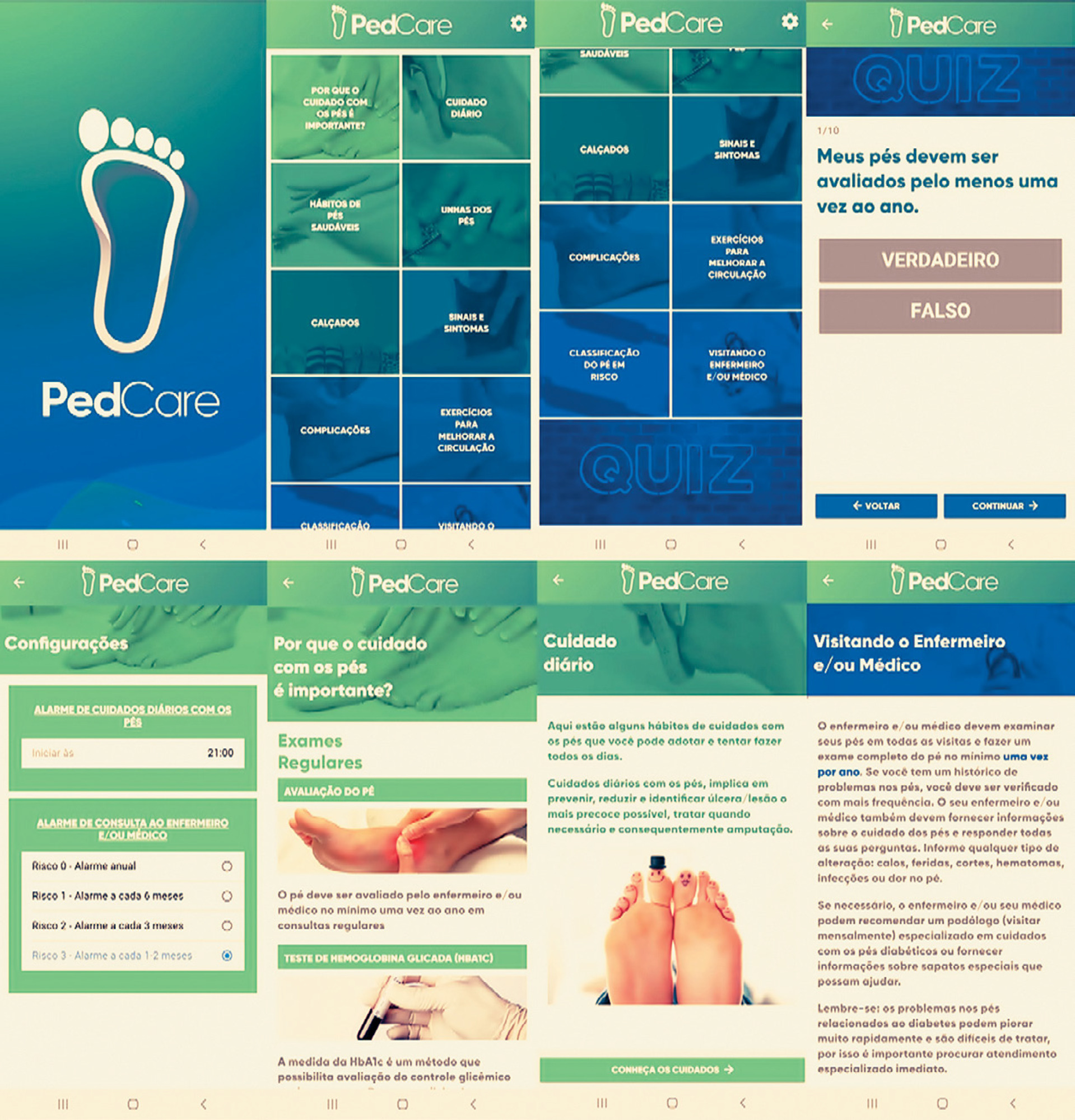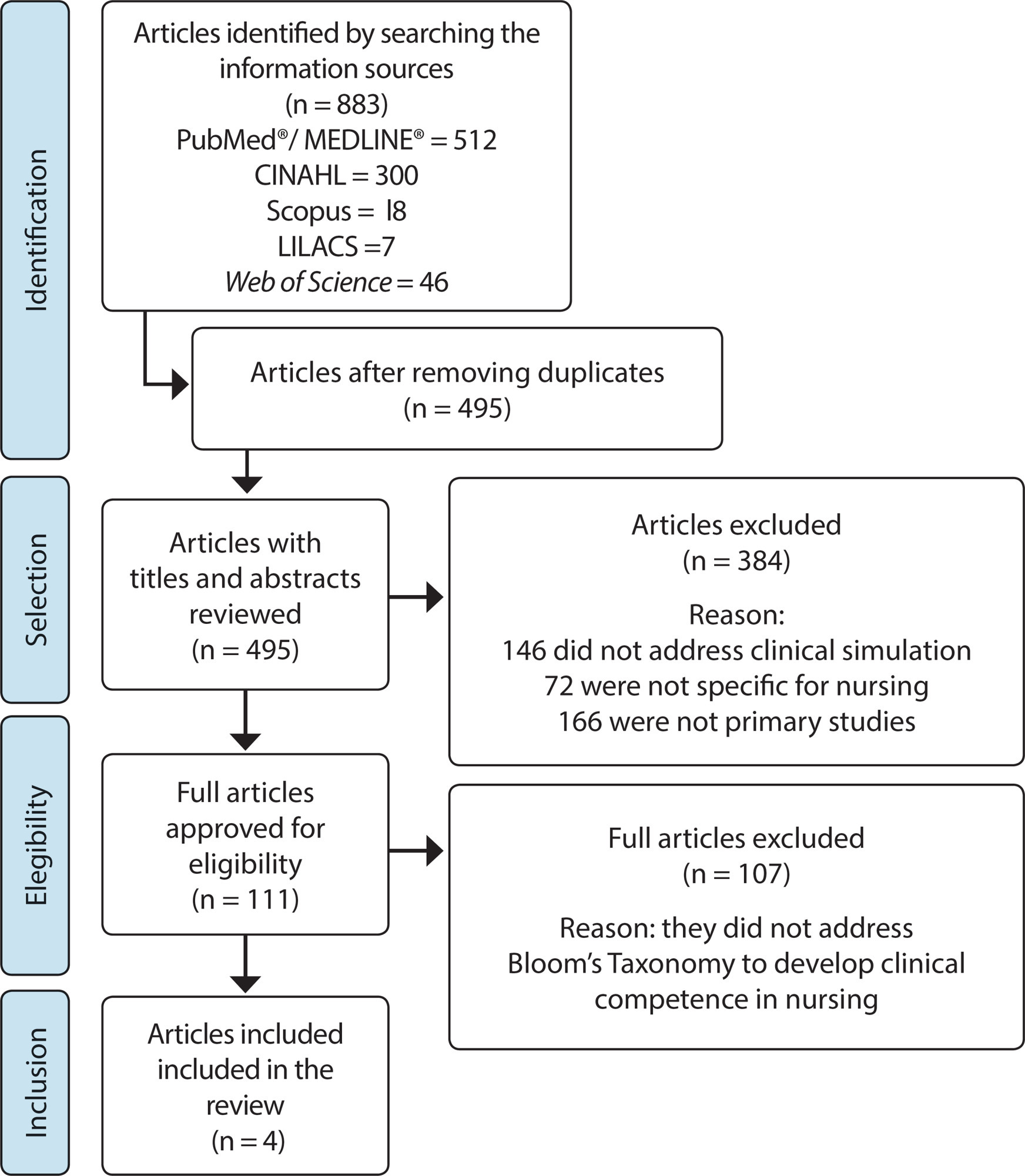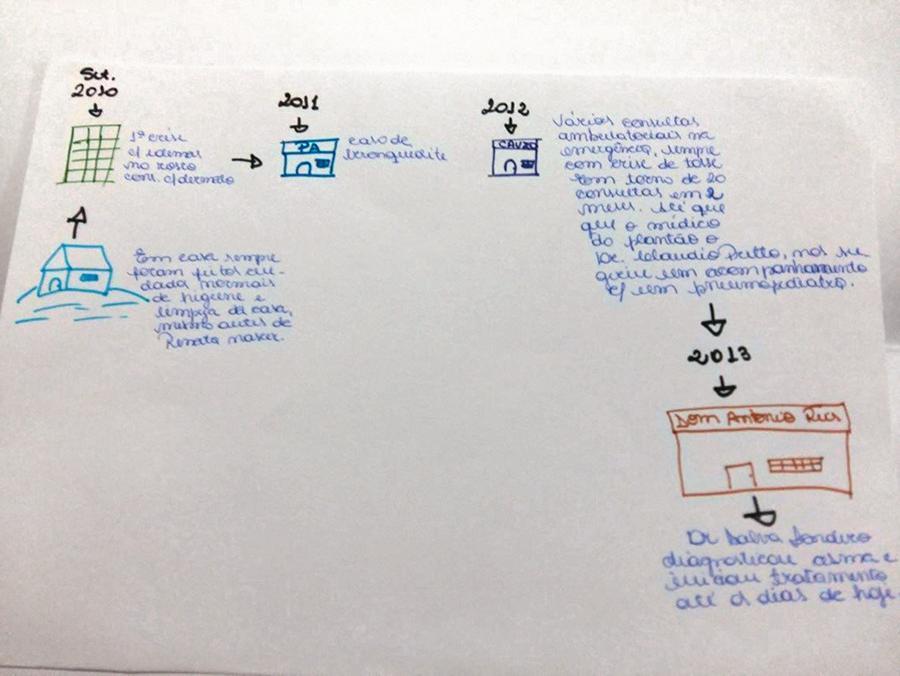-
09-23-2024
Brazilian National Palliative Care Policy: reflections based on the 2030 Agenda for Sustainable Development
Revista Brasileira de Enfermagem. 2024;77(6):e770601
Abstract
Brazilian National Palliative Care Policy: reflections based on the 2030 Agenda for Sustainable Development
Revista Brasileira de Enfermagem. 2024;77(6):e770601
DOI 10.1590/0034-7167.2024770601
Views1The 2030 Agenda for Sustainable Development, an action plan for people, planet and prosperity, is a global action plan adopted by representatives of all 193 United Nations Member States, meeting at United Nations Headquarters, in New York, from September 25 to 27, 2015. By achieving 17 sustainable objectives, the Agenda aims to promote sustainable development […]See more -
09-23-2024
Política Nacional de Cuidados Paliativos: reflexões a partir da Agenda 2030 para o Desenvolvimento Sustentável
Revista Brasileira de Enfermagem. 2024;77(6):e770601
Abstract
Política Nacional de Cuidados Paliativos: reflexões a partir da Agenda 2030 para o Desenvolvimento Sustentável
Revista Brasileira de Enfermagem. 2024;77(6):e770601
DOI 10.1590/0034-7167.2024770601pt
Views2A Agenda 2030 para o Desenvolvimento Sustentável, um plano de ação para as pessoas, para o planeta e para a prosperidade, é um plano de ação global adotado por representantes de todos os 193 Estados-Membros das Nações Unidas, reunidos na sede das Nações Unidas, em Nova York, de 25 a 27 de setembro de 2015. […]See more -
ORIGINAL ARTICLE09-20-2024
Transgender people’s knowledge about the adverse effects of cross-hormonization: challenges for nursing
Revista Brasileira de Enfermagem. 2024;77(4):e20230346
Abstract
ORIGINAL ARTICLETransgender people’s knowledge about the adverse effects of cross-hormonization: challenges for nursing
Revista Brasileira de Enfermagem. 2024;77(4):e20230346
DOI 10.1590/0034-7167-2023-0346
Views0See moreABSTRACT
Objectives:
to identify trans women’s and men’s knowledge about the adverse effects of cross-hormonization and understand the repercussions of hormonization practices on trans women’s and men’s health.
Methods:
exploratory, descriptive, qualitative research, developed with 41 participants, from July 2019 to February 2020, in a trans health outpatient clinic. Thematic-categorical content analysis was used.
Results:
from the analysis, the categories emerged: Knowledge about the adverse effects of cross-hormonization; and Cross-hormonization practices and their meaning.
Final Considerations:
nursing practices, based on the identification of knowledge about adverse effects and the understanding of cross-hormonization practices in trans women’s and men’s health, can result in more inclusive care.
-
ORIGINAL ARTICLE09-20-2024
Content validity of guidance on self-care in the post-operative period for breast cancer
Revista Brasileira de Enfermagem. 2024;77(4):e20240188
Abstract
ORIGINAL ARTICLEContent validity of guidance on self-care in the post-operative period for breast cancer
Revista Brasileira de Enfermagem. 2024;77(4):e20240188
DOI 10.1590/0034-7167-2024-0188
Views0See moreABSTRACT
Objectives:
to validate the content of a guidance guide on self-care in the postoperative period of breast surgery for breast cancer.
Methods:
a methodological study with content validity, carried out with 15 expert nurses and physiotherapists, between May and July 2022. Recruitment took place from the Lattes Platform, using snowball sampling. The level of relevance and representativeness for each item was verified using the Content Validity Index (CVI). It was considered valid when CVI was equal to or greater than 78% (0.78).
Results:
from the initial total of 37 items, two were excluded, as they had insufficient practical relevance and theoretical relevance, and another five items which, although presenting a CVI lower than the established cut-off, were suggested to be rewritten and grouped with other similar items.
Conclusions:
thirty items were considered valid and demonstrated important and significant characteristics, constituting suitable material for application in clinical practice.
-
ORIGINAL ARTICLE09-20-2024
Sociocognitive factors determining compliance with standard precautions by nursing professionals during the COVID-19 pandemic
Revista Brasileira de Enfermagem. 2024;77(4):e20230301
Abstract
ORIGINAL ARTICLESociocognitive factors determining compliance with standard precautions by nursing professionals during the COVID-19 pandemic
Revista Brasileira de Enfermagem. 2024;77(4):e20230301
DOI 10.1590/0034-7167-2023-0301
Views0See moreABSTRACT
Objectives:
to assess the socio-cognitive factors determining adherence to standard precautions by nursing professionals in care practice during the COVID-19 pandemic in Brazil.
Methods:
an analytical cross-sectional study, carried out with 9,039 nursing professionals in Brazil, using an electronic form containing participant sociodemographic, training and work variables, and the Brazilian version of the Standard Precautions Questionnaire. Descriptive and inferential statistics were used using the statistical software R.
Results:
participants recognize standard precautions as effective measures to reduce infections and report intention to perform them. Training regarding standard precautions was evidenced as a facilitator of adherence (4.72; SD: 0.73), and problems related to materials (3.78; SD: 1.45) were a hindrance.
Conclusions:
among the determining factors, facilitating organization presented the highest score, followed by intention to perform. Facilitating and hindering factor identification makes it possible to develop intervention strategies to strengthen patient safety and reduce occupational risks among professionals.
-
ORIGINAL ARTICLE09-20-2024
Predictor variables effect on the development of Burnout Syndrome in higher education professor
Revista Brasileira de Enfermagem. 2024;77(4):e20240132
Abstract
ORIGINAL ARTICLEPredictor variables effect on the development of Burnout Syndrome in higher education professor
Revista Brasileira de Enfermagem. 2024;77(4):e20240132
DOI 10.1590/0034-7167-2024-0132
Views0See moreABSTRACT
Objectives:
to correlate the development of Burnout Syndrome in higher education professors with the following variables: sociodemographic, economic, work, sleep pattern, level of anxiety and quality of life.
Methods:
observational, analytical, cross-sectional study with a quantitative approach. Data collection took place from August to November 2022, with 140 professors from a private higher education institution in the Western Brazilian Amazon.
Results:
professors who carried out activities outside institutional hours and who had sleep duration < 5 hours, presented lower scores in the personal fulfillment dimension of burnout, with (p=0.002) and (p=0.001), respectively. The higher the scores for the physical (p=0.001), psychological (p=0.000) and social relationships (p=0.002) domains of quality of life, the lower the personal fulfillment scores for the syndrome.
Conclusions:
through linear regression, it was evidenced that several variables explain the development of burnout. Institutional and governmental actions can minimize the negative influence of these variables.
-
ORIGINAL ARTICLE09-20-2024
Risk assessment for postoperative complications in patients undergoing cardiac surgical procedures
Revista Brasileira de Enfermagem. 2024;77(4):e20230127
Abstract
ORIGINAL ARTICLERisk assessment for postoperative complications in patients undergoing cardiac surgical procedures
Revista Brasileira de Enfermagem. 2024;77(4):e20230127
DOI 10.1590/0034-7167-2023-0127
Views0See moreABSTRACT
Objectives:
to evaluate the risk of postoperative complications in cardiac patients.
Methods:
an evaluative study using the Tuman Score on medical records of 70 adult patients who underwent cardiac surgery at a University Hospital. The R for Windows software was used for the analyses. Descriptive statistics and bivariate analysis were employed to verify the association between the risk score and complications. The relative risk between the Tuman Score and postoperative complications was obtained through Quasi-Poisson regression, with a 95% confidence interval.
Results:
the majority of the patients were male (58.57%), aged between 41-64 years (50%), who underwent myocardial revascularization (50%). These patients were associated with a lower risk of postoperative complications (p=0.003), (p=0.008), and (p=0.000), respectively. High-risk patients had pulmonary complications (RR=1.32, p=0.002) and neurological complications (RR=1.20, p=0.047).
Conclusions:
preoperative risk assessment promotes qualified care to reduce postoperative complications.
-
ORIGINAL ARTICLE09-20-2024
Construction and validation of a checklist for the management of totally implanted catheters in children
Revista Brasileira de Enfermagem. 2024;77(4):e20230447
Abstract
ORIGINAL ARTICLEConstruction and validation of a checklist for the management of totally implanted catheters in children
Revista Brasileira de Enfermagem. 2024;77(4):e20230447
DOI 10.1590/0034-7167-2023-0447
Views0See moreABSTRACT
Objectives:
to construct and validate the content of a checklist for the management of totally implanted catheters in hospitalized children and adolescents.
Methods:
methodological research conducted from October 2021 to December 2022 in two stages: development of the instrument with care guidelines and content validation of the checklist. The instrument, containing 23 items presented in Likert format, was evaluated online by specialists in two rounds. The Content Validity Index was applied, considering indices above 0.8 as valid.
Results:
the final checklist included four domains and 22 checklist items, validated with a Content Validity Index of 0.98. The overall evaluation of the instrument presented a global score of 9.9.
Conclusions:
the validation and application of instruments that standardize procedures, in addition to supporting professionals, promote autonomy and quality of care for children and adolescents using this device.

-
REVIEW06-01-2020
Access of the black population to health services: integrative review
Revista Brasileira de Enfermagem. 2020;73(4):e20180834
Abstract
REVIEWAccess of the black population to health services: integrative review
Revista Brasileira de Enfermagem. 2020;73(4):e20180834
DOI 10.1590/0034-7167-2018-0834
Views1See moreABSTRACT
Objectives:
demonstrate and discuss how the black population’s access to health services occurs
Methods:
integrative literature review with the following question: How does the black population’s access to health services occur? The search was carried out in the Scholar, LILACS and SciELO databases and used the descriptor “access to health services” and the term “population,” resulting in a sample with twelve articles.
Results:
studies show that the difficulty of access is a fundamental factor for the quality of life of people, directly compromising preventive services, especially for women’s health and, in addition, it has significant impact on the illness process of the black population within its particularities.
Final Considerations:
several limiting factors compromise the black population’s access to health services, including institutional and structural factors

-
REVIEW11-06-2020
Transitional care to caregivers of dependent older people: an integrative literature review
Revista Brasileira de Enfermagem. 2020;73:e20200394
Abstract
REVIEWTransitional care to caregivers of dependent older people: an integrative literature review
Revista Brasileira de Enfermagem. 2020;73:e20200394
DOI 10.1590/0034-7167-2020-0394
Views1See moreABSTRACT
Objective:
To identify the needs of caregivers of dependent older people related to self-care in the transition from hospital to home.
Methods:
Integrative literature review that followed a predefined protocol, carried out from March to May 2019 in the platforms EBSCO, B-On, Scopus, Web of Science, and Joanna Briggs Institute. Descriptors and eligibility criteria were defined for the bibliographic sample, which was ten articles. The search was limited to articles published between 2015 and 2019 to guarantee evidence topicality.
Results:
The needs of caregivers related to transitional care can be grouped into five categories: needs in the transition into the role of caregiver; needs related to self-care of caregivers themselves; health needs; economic needs; and social and collective needs.
Final considerations:
The work developed by nurses regarding transitional care of caregivers must have two focuses: managing care provided to dependent older people and managing the needs of caregivers and the care offered to them.

-
REVIEW10-19-2020
Validation methods of nursing protocols: an integrative review
Revista Brasileira de Enfermagem. 2020;73:e20200050
Abstract
REVIEWValidation methods of nursing protocols: an integrative review
Revista Brasileira de Enfermagem. 2020;73:e20200050
DOI 10.1590/0034-7167-2020-0050
Views0See moreABSTRACT
Objective:
to identify scientific production about validation methods of nursing care protocols.
Method:
an integrative review with search at Scielo, Pubmed/MEDLINE, Virtual Health Library, Web of Science, Scopus, and EBSCOhost. The descriptors “validation studies”, “validation studies as topic”, “protocols”, “clinical protocols”, “practice guidelines as topic”, “nursing” and “nursing assessment” and the uncontrolled descriptor “validation” were used.
Results:
thirty-two articles were selected, most of them Brazilian. Content validation by experts was the most frequent method, with no consensus on the number of participants for the process. The collection instruments were mostly created by the authors. Data analysis was performed using descriptive statistics and Content Validity Index, with a variable consensus rate in the analyzed articles.
Conclusion:
protocols validated by experts are robust tools for use in clinical practice, with methodological rigor in development essential for its quality.

-
ORIGINAL ARTICLE05-24-2021
PEDCARE: validation of a mobile application on diabetic foot self-care
Revista Brasileira de Enfermagem. 2021;74:e20200856
Abstract
ORIGINAL ARTICLEPEDCARE: validation of a mobile application on diabetic foot self-care
Revista Brasileira de Enfermagem. 2021;74:e20200856
DOI 10.1590/0034-7167-2020-0856
Views0See moreABSTRACT
Objective:
to describe the process of validating a multimedia application on a mobile platform to promote foot care for people with diabetes.
Method:
a technological production and methodological type study. Content and appearance were validated by 39 judges (29 nursing judges and ten information and communication technology judges and 15 people from the target audience).
Results:
nursing judges made it possible to validate the material with a total Content Validity Index of 0.95, a non-significant binomial test for most items and Cronbach’s alpha of 0.92, information and communication technology judges with Suitability Assessment of Materials of 99.2% and the target audience with an agreement index of 98%.
Conclusion:
the application proved to be valid and reliable for use in clinical practice as an educational technology to promote foot care for people with diabetes.

-
EXPERIENCE REPORT04-09-2020
Implementation of an Artificial Intelligence Algorithm for sepsis detection
Revista Brasileira de Enfermagem. 2020;73(3):e20180421
Abstract
EXPERIENCE REPORTImplementation of an Artificial Intelligence Algorithm for sepsis detection
Revista Brasileira de Enfermagem. 2020;73(3):e20180421
DOI 10.1590/0034-7167-2018-0421
Views0See moreABSTRACT
Objectives:
to present the nurses’ experience with technological tools to support the early identification of sepsis.
Methods:
experience report before and after the implementation of artificial intelligence algorithms in the clinical practice of a philanthropic hospital, in the first half of 2018.
Results:
describe the motivation for the creation and use of the algorithm; the role of the nurse in the development and implementation of this technology and its effects on the nursing work process.
Final Considerations:
technological innovations need to contribute to the improvement of professional practices in health. Thus, nurses must recognize their role in all stages of this process, in order to guarantee safe, effective and patient-centered care. In the case presented, the participation of the nurses in the technology incorporation process enables a rapid decision-making in the early identification of sepsis.
-
REVIEW03-24-2021
Development of clinical competence in nursing in simulation: the perspective of Bloom’s taxonomy
Revista Brasileira de Enfermagem. 2021;74(1):e20200135
Abstract
REVIEWDevelopment of clinical competence in nursing in simulation: the perspective of Bloom’s taxonomy
Revista Brasileira de Enfermagem. 2021;74(1):e20200135
DOI 10.1590/0034-7167-2020-0135
Views0See moreABSTRACT
Objectives:
to investigate the scientific evidence on the use of Bloom’s taxonomy for developing competence in nursing professionals and students in clinical simulation.
Methods:
integrative review of the National Library of Medicine (NLM), National Institutes of Health (NIH), Cumulative Index to Nursing and Allied Health Literature (CINAHL), Latin American and Caribbean Literature in Health Sciences (LILACS), Web of Science and SCOPUS databases, using the Rayyan application.
Results:
a total of 871 studies were identified; four composed the sample. The development of clinical competence occurred through the coordination of knowledge, skills, and attitudes. To develop the cognitive domain, the objectives of knowledge and comprehension of the Bloom’s taxonomy were mobilized. The psychomotor domain required development of the skills demanded by the proposed clinical care. The affective domain was developed through will and motivation to learn.
Conclusions:
it is possible to develop clinical competence in nursing by adopting Bloom’s taxonomy in each phase of clinical simulation.

-
03-27-2020
Coronavirus 2020
Revista Brasileira de Enfermagem. 2020;73(2):e2020n2
Abstract
Coronavirus 2020
Revista Brasileira de Enfermagem. 2020;73(2):e2020n2
DOI 10.1590/0034-7167-2020730201
Views0Emerging and reemerging infectious diseases are constant challenges for public health worldwide. Recent cases of pneumonia of unknown cause in Wuhan, China, have led to the discovery of a new type of Coronavirus (2019-nCoV), which are enveloped RNA viruses, commonly found in humans, other mammals and birds, capable of causing respiratory, enteric, hepatic, and neurological […]See more -
ORIGINAL ARTICLE12-13-2019
Accessibility of children with special health needs to the health care network
Revista Brasileira de Enfermagem. 2019;72:65-71
Abstract
ORIGINAL ARTICLEAccessibility of children with special health needs to the health care network
Revista Brasileira de Enfermagem. 2019;72:65-71
DOI 10.1590/0034-7167-2017-0899
Views0See moreABSTRACT
Objective:
To know how children with special health needs access the health care network.
Method:
This is a qualitative research of descriptive-exploratory type, developed using semi-structured interviews mediated by the Talking Map design. Participants were 19 family caregivers of these children in two Brazilian municipalities. Data were submitted to inductive thematic analysis.
Results:
Difficulties were mentioned from the diagnosis moment to the specialized follow-up, something represented by the itinerary of the c hild and his/her family in the search for the definition of the medical diagnosis and the access to a specialized professional; a gap between the children’s needs and the care offered was observed in primary health care.
Conclusion:
The access of children with special health needs is filled with obstacles such as slowness in the process of defining the child’s diagnosis and referral to a specialist. Primary health care services were replaced by care in emergency care units.

Search
Search in:
Nuvem de Tags
Adolescente (85) Atenção Primária à Saúde (239) COVID-19 (91) Criança (91) Cuidados de Enfermagem (269) Educação em Enfermagem (151) Educação em Saúde (139) Enfermagem (930) Enfermagem Pediátrica (86) Estudantes de Enfermagem (77) Estudos de Validação (131) Família (87) Idoso (208) Promoção da Saúde (99) Qualidade de Vida (104) Saúde do Trabalhador (86) Saúde Mental (145) Saúde Pública (82) Segurança do Paciente (150) Tecnologia Educacional (100)



